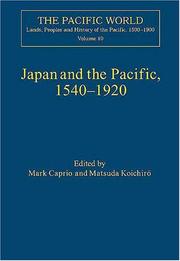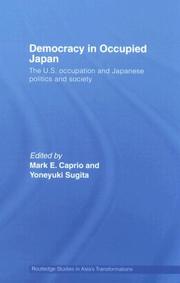| Listing 1 - 6 of 6 |
Sort by
|
Book
ISBN: 0295990406 Year: 2009 Publisher: Seattle : University of Washington Press,
Abstract | Keywords | Export | Availability | Bookmark
 Loading...
Loading...Choose an application
- Reference Manager
- EndNote
- RefWorks (Direct export to RefWorks)
Koreans --- Cultural assimilation --- History --- Japan --- Korea --- Colonies --- Foreign relations
Book
ISBN: 9780295990408 9780295989006 9780295989013 0295990406 0295989009 0295989017 Year: 2009 Publisher: Seattle University of Washington Press
Abstract | Keywords | Export | Availability | Bookmark
 Loading...
Loading...Choose an application
- Reference Manager
- EndNote
- RefWorks (Direct export to RefWorks)
From the late nineteenth century, Japan sought to incorporate the Korean Peninsula into its expanding empire. Japan took control of Korea in 1910 and ruled it until the end of World War II. During this colonial period, Japan advertised as a national goal the assimilation of Koreans into the Japanese state. It never achieved that goal. Mark Caprio here examines why Japan's assimilation efforts failed. Utilizing government documents, personal travel accounts, diaries, newspapers, and works of fiction, he uncovers plenty of evidence for the potential for assimilation but very few practical initiatives to implement the policy.Japan's early history of colonial rule included tactics used with peoples such as the Ainu and Ryukyuan that tended more toward obliterating those cultures than to incorporating the people as equal Japanese citizens. Following the annexation of Taiwan in 1895, Japanese policymakers turned to European imperialist models, especially those of France and England, in developing strengthening its plan for assimilation policies. But, although Japanese used rhetoric that embraced assimilation, Japanese people themselves, from the top levels of government down, considered Koreans inferior and gave them few political rights. Segregation was built into everyday life. Japanese maintained separate communities in Korea, children were schooled in two separate and unequal systems, there was relatively limited intermarriage, and prejudice was ingrained. Under these circumstances, many Koreans resisted assimilation. By not actively promoting Korean-Japanese integration on the ground, Japan's rhetoric of assimilation remained just that.
Koreans --- Cultural assimilation --- History --- Japan --- Korea --- Colonies --- Foreign relations

ISBN: 0754636836 Year: 2006 Publisher: Aldershot Ashgate
Abstract | Keywords | Export | Availability | Bookmark
 Loading...
Loading...Choose an application
- Reference Manager
- EndNote
- RefWorks (Direct export to RefWorks)
Japanese --- Japan --- Japan --- Pacific Area --- Pacific Area --- Pacific Area --- Foreign economic relations --- Relations --- Ethnic relations. --- Foreign economic relations --- Relations

ISBN: 9780415415897 0415415896 9780203964255 9781134118571 9781134118618 9781134118625 9780415560597 Year: 2007 Publisher: London Routledge
Abstract | Keywords | Export | Availability | Bookmark
 Loading...
Loading...Choose an application
- Reference Manager
- EndNote
- RefWorks (Direct export to RefWorks)
J4000.90 --- J4600.90 --- J3389 --- Japan: Social history, history of civilization -- postwar Shōwa (1945- ), Heisei period (1989- ), contemporary --- Japan: Politics and law -- history -- postwar Shōwa (1945- ), Heisei period (1989- ), contemporary --- Japan: History -- Gendai, modern -- Shōwa period -- World War II -- occupation period (1945-1952) --- Democracy --- Japan --- United States --- Civilization --- American influences. --- Foreign relations --- History --- Politics and government
Book
ISBN: 9781137408112 9781137408105 Year: 2015 Publisher: London Palgrave Macmillan
Abstract | Keywords | Export | Availability | Bookmark
 Loading...
Loading...Choose an application
- Reference Manager
- EndNote
- RefWorks (Direct export to RefWorks)
The moment of Japan's defeat in 1945 artificially dissects its history. Not long after the Meiji Restoration, Japan acquired Ezo (present-day Hokkaido) and the Ryky Islands (present-day Okinawa). Later in the Meiji Period it annexed Taiwan, southern Sakhalin, and the Korean peninsula. Before the Asia-Pacific War ended in 1945, Japan controlled territories in China, Manchuria, Southeast Asia and the Pacific but with its acceptance of the Potsdam Declaration in August 1945, Japan lost most of these acquisitions. Examining issues and experiences as part of either a prewar/wartime or postwar context impedes our ability to understand the influence that one period had on the other. How do occupiers maintain their position of power and influence over the people of the state it occupies? How did Japan's leadership and people manage the transition from that of occupier of other territories to that of being occupied by foreign powers? How did this transition affect different aspects of society, from the civilian to the military, the political to the bureaucratic? How did Japanese occupation affect those it had power over, from dissenters to collaborators? What long term impacts did military occupation have on the occupied in terms of memory, commemoration and repatriation?Japan as the Occupier and the Occupied investigates these types of questions by examining transwar transitions in Japan proper and the various territories that it controlled, including Korea, Borneo, Singapore, Manchuria and China. Through taking this approach, a more nuanced understanding of Japan's role as occupier and occupied emerges. More generally, the book contributes to scholarship on the power dynamics of military occupation and the complexities that emerge during, and in the aftermath of, imperial and military expansion, control, and retreat.
Military history --- World War, 1939-1945 --- Asia—History --- Japan—History
Book
ISBN: 9780815378792 9781351227902 Year: 2018 Publisher: London Routledge, Taylor & Francis Group
Abstract | Keywords | Export | Availability | Bookmark
 Loading...
Loading...Choose an application
- Reference Manager
- EndNote
- RefWorks (Direct export to RefWorks)
| Listing 1 - 6 of 6 |
Sort by
|

 Search
Search Feedback
Feedback About
About Help
Help News
News